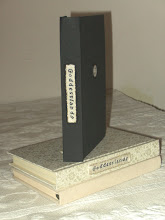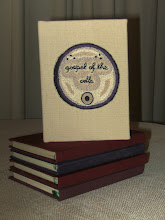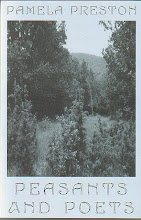Presents its latest title:
DESERT CONFESSIONS
Of a Temporary Anchorite
Deluxe, Limited Edition
Superior paper
Silk cloth covers
Three-strand embroidery thread
Silk ribbons
Hand-sewn and cased
Color illustrations
212 pages
The Inside Job
INTRODUCTION
Here begins the confessions of one anchored in the
desert, continuing what began in a valley in the French Pyrenees 23 years
ago—this evolution in the expanse of memory’s incarnations as it lives the questions.
These incarnations
have taken form through many entries and departures; expansions and
dissolutions; accumulations and renunciations of inner and outer possessions
that no longer serve. All this, so to
move on to the new. The process has
proven to be circular—an ongoing journey to the center of being, the images of
which I have attempted to depict in embroidered mandalas.
In my life
in the desert, I found companionship with CG Jung’s Red Book, alchemical texts,
dreams, dialogues with archetypes, and a few special friends—first responders
on our path to wholeness. A year into
this inner exploration I found Jean-Jacques Rousseau’s Confessions. He, like
myself, bore the wounds of childhood abandonment. He also wandered the earth destitute until he
found his calling. He felt at home in
the foothills of the Alps , circa 1700's as I had flourished in the foothills
of the Pyrenees , circa 1990’s.
Little did Rousseau know in the 1700’s that he was
crusading psychoanalytic therapies, easily at our disposal in the 21st
century. In his Confessions and Reveries of a
Solitary Walker that followed, he
struggled to achieve victory over his emotional anguish. He sought to find understanding of his inner
self while not only unsupported by his philosophe
peers, but condemned by them. Banished
from the society he loved, he held anchor to his own truth. He also sought meaning for his physical
ailments and was often in the grips of maladie
imaginaire. But imagined illness can
appear and feel real. Today, there is
growing knowledge that the body and psyche’s symptoms are wise informants. I have named these informants bodysoul.
I continue
the evolution of my story in these pages with the understanding that she whom I
call soul is the giver of images and the
recipient. Who am I to know that, in
obedience to her and therefore myself, she is not expanding our little story to
a larger one? Who am I to presume that
any phrase or poem has arrived from the poet and not the muse? Who am I?
Only the omega to her alpha and the servant to her crown.
Perhaps we
all have an anchorite within, a small voice in the wilderness of the
unconscious that responds to Juvenal’s words, vitam impendere vero—‘To thine own self be true.’ Perhaps in our own unique ways we are living
through our questions to an end that never ends. I begin again not
knowing the answers. I can only say I
tried.
Excerpts
















